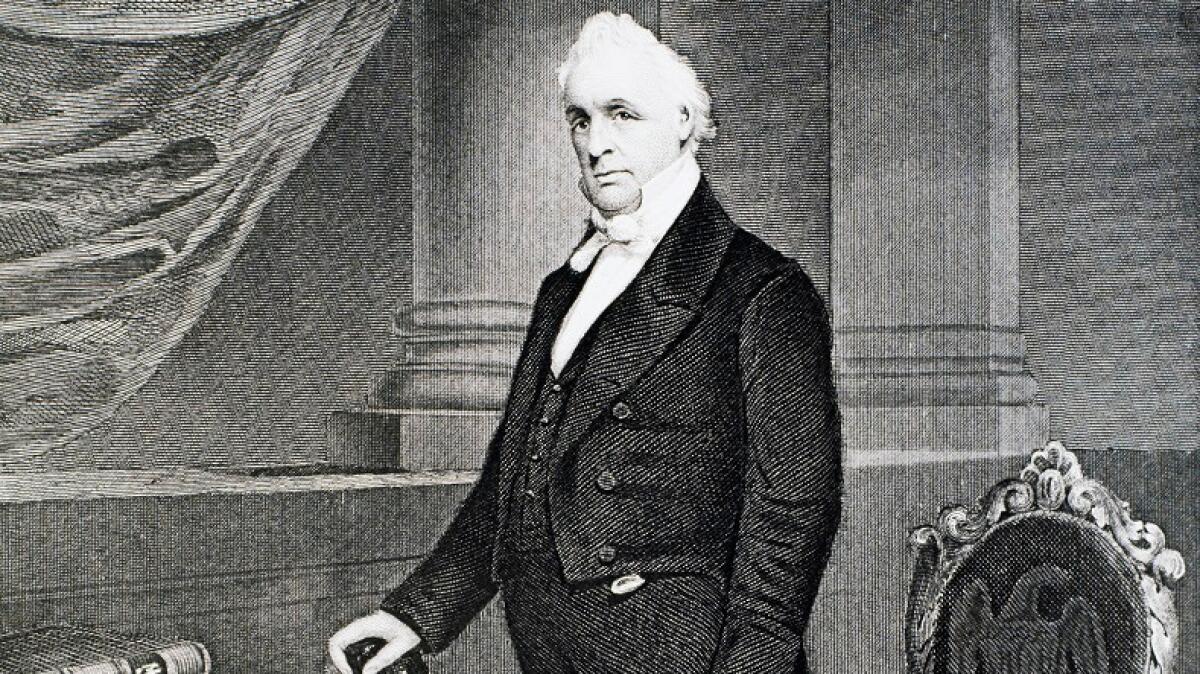Is Trump the worst president ever? He’s got some competition

- Share via
It seems obvious that Donald Trump is the worst president in my lifetime.
I briefly considered the possibility that he was less awful than Richard Nixon, who resigned in disgrace in 1974. But at least Nixon created the Environmental Protection Agency and signed the Endangered Species Act when he wasn’t covering up the Watergate burglary or calling for tax audits on his political enemies. So in the end, in my view, there’s no contest.
But that raised a further question: Is Trump the worst president in all of U.S. history?
Now that’s a hard one. The presidents widely deemed the worst prior to Trump entering the competition included James Buchanan, who in the late 1850s pursued extreme pro-slavery positions; Warren Harding, who ran an incompetent administration in the 1920s and presided over the Teapot Dome scandal; Andrew Johnson, who undermined reconstruction after the Civil War; and Franklin Pierce, who in the 1850s was a “servile tool of men worse than himself ... ever ready to do any work the slavery leaders set him,” in the words of Theodore Roosevelt.
And there are nearly four dozen presidents in all, serving over the course of more than two centuries.
I quickly realized I was in over my head trying to determine who was worst among them. Is a corrupt president worse than a incompetent president? Is it worse to separate children from their parents at the border or to allow fugitive slaves to be caught and delivered back to their owners? Is killing thousands of Native Americans worse than denying the existential dangers of climate change? Do the 12 presidents who owned slaves belong automatically at the bottom of the list, regardless of their other achievements or the times in which they lived?
Stymied by these complications, I started calling historians.
Of course, there was some hemming and hawing, as they offered caveats of the sort serious experts routinely give before being asked to do silly exercises by journalists. They noted that the passions of the day have to cool before a definitive judgment can be made, and that new information and documents that transform our understanding of a presidency often become available only after 25 or 30 years. We don’t even know yet whether this president will win a second term, which could reshape his reputation, for better or worse.
But once those caveats were out of the way, the historians lit into Trump.
“Donald Trump, if he loses this election, will go down as one of the worst presidents in history because of his failure to unite the country, his abysmal handling of COVID and his xenophobic and racist tweets,” said Douglas Brinkley, a history professor at Rice University. “He’ll be remembered for leaving the country worse off than he found it. He’ll be down at the very bottom of the rankings hanging out with James Buchanan and Franklin Pierce.”
Jonathan Alter, a historian and journalist who just published “His Very Best,” a biography of Jimmy Carter, was equally withering.
“If you want to ask who was the most racist, then, fine, it’ll be one of the slaveholder presidents,” Alter said. “But who did the most damage to our ideals and values? It’s Trump.”
Neither Alter nor Brinkley would say that Trump was the worst ever by all measures. But down near the bottom? Oh yeah. Robert Dallek, a historian and presidential biographer, agreed.
“This guy has been so extreme and shows such little understanding of the job or the country that we can begin to judge him now,” Dallek said. “He is certainly the worst president since Warren G. Harding, who served from 1921 to 1923. Whether he’s the worst or next-to-the-worst in history — that’ll be the argument among historians in the future. Is he as poor a president as James Buchanan was? I don’t know, but I don’t think he rises much above that.”
The historians noted that presidential reputations can fluctuate over time.
For instance, Harry Truman and Dwight Eisenhower have gone up significantly in historians’ esteem in recent years thanks to newly released information and new biographies.
Andrew Jackson, once viewed as a populist who fought for ordinary Americans against the privileged, has moved in the other direction, and is now more identified by many people as a slave owner and killer of Native Americans. (Obama moved to replace him on the $20 bill with Harriet Tubman; Trump has postponed that.)
But the reputations of the greatest presidents remain mostly constant. They include George Washington, who peacefully transferred power to his successor, setting the U.S. on the road to democracy; Abraham Lincoln, who ended slavery and led the country through the Civil War; and Franklin Delano Roosevelt, whose New Deal pulled the U.S. out of the Great Depression and who guided the country through World War II.
Historian Doris Kearns Goodwin has written that the presidents who have fared best in times of turbulence shared certain qualities. Among them are empathy, humility, resilience, willingness to acknowledge error and self-reflection.
Those, it goes almost without saying, are not qualities generally associated with our current president. That may be why — despite his repeated hints that he’d like to see his own face carved onto Mt. Rushmore —Trump is unlikely to knock any of the greats out of the pantheon.
Sadly, Trump seems destined to spend posterity in the company of Buchanan, Pierce and Andrew Johnson, rather than on a mountaintop with Washington and Lincoln.
More to Read
A cure for the common opinion
Get thought-provoking perspectives with our weekly newsletter.
You may occasionally receive promotional content from the Los Angeles Times.







